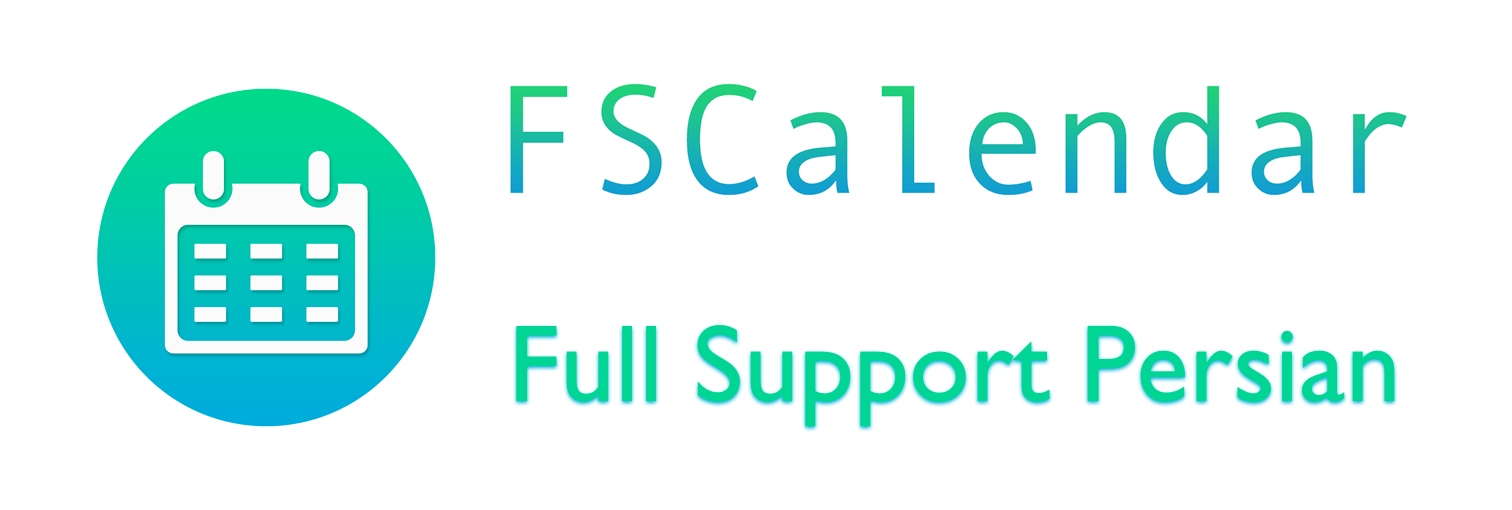 |
 |
 |
|---|---|---|
 |
 |
 |
| iOS8/9 | iOS10 |
|---|---|
 |
 |
 |
|---|
 |
|---|
To customize your own cell, view DIY Example in
Example-SwiftorExample-Objc
| Single-Selection Swipe-To-Choose |
Multiple-Selection Swipe-To-Choose |
DIY Swipe-To-Choose |
|---|---|---|
 |
 |
 |
|  |
|  |
|  |
| 
|
| ------------- | ------------- | ------------- | ------------- |
More Achievements are available in FSCalendar Gallery
- For iOS8+: 👍
use_frameworks!
target '<Your Target Name>' do
pod 'FSCalendar+Persian'
end- For iOS7+:
target '<Your Target Name>' do
pod 'FSCalendar+Persian'
endNSCalendarExtension is required to get iOS7 compatibility.
- For iOS8+
github "hussein_hj/FSCalendar"- Drag all files under
FSCalendarfolder into your project. 👍
Alternatively to give it a test run, simply press
command+uinExample-ObjcorExample-Swiftand launch the UITest Target.
Only the methods marked "👍" support IBInspectable / IBDesignable feature. Have fun with Interface builder
1、 Drag an UIView object to ViewController Scene
2、 Change the Custom Class to FSCalendar
3、 Link dataSource and delegate to the ViewController
4、 Finally, implement FSCalendarDataSource and FSCalendarDelegate in your ViewController
@property (weak , nonatomic) FSCalendar *calendar;// In loadView(Recommended) or viewDidLoad
FSCalendar *calendar = [[FSCalendar alloc] initWithFrame:CGRectMake(0, 0, 320, 300)];
calendar.dataSource = self;
calendar.delegate = self;
[self.view addSubview:calendar];
self.calendar = calendar;- To use
FSCalendarin swift, you need to Create Bridge Header first.
fileprivate weak var calendar: FSCalendar!// In loadView or viewDidLoad
let calendar = FSCalendar(frame: CGRect(x: 0, y: 0, width: 320, height: 300))
calendar.dataSource = self
calendar.delegate = self
view.addSubview(calendar)
self.calendar = calendarTo use FSCalendar in Swift3, see
Example-Swiftfor details.
It's easy (Objective-C) :
calendar.locale = [NSLocale localeWithLocaleIdentifier:@"fa-IR"];
calendar.identifier = NSCalendarIdentifierPersian;
calendar.firstWeekday = 7;
....
#pragma mark - FSCalendarDataSource
- (NSDate *)minimumDateForCalendar:(FSCalendar *)calendar {
return [self.dateFormatter dateFromString:@"2016-07-08"];
}Swift :
calendar.locale = NSLocale.init(localeIdentifier: "fa-IR") as Locale
calendar.identifier = NSCalendar.Identifier.persian.rawValue
calendar.firstWeekday = 7
....
// MARK:- FSCalendarDataSource
func minimumDate(for calendar: FSCalendar) -> Date {
return self.formatter.date(from: "2016-07-08")!
}Also can see here where is these codes
FSCalendar doesn't update frame by itself, Please implement
- For AutoLayout
- (void)calendar:(FSCalendar *)calendar boundingRectWillChange:(CGRect)bounds animated:(BOOL)animated
{
self.calendarHeightConstraint.constant = CGRectGetHeight(bounds);
// Do other updates here
[self.view layoutIfNeeded];
}- For Manual Layout
- (void)calendar:(FSCalendar *)calendar boundingRectWillChange:(CGRect)bounds animated:(BOOL)animated
{
calendar.frame = (CGRect){calendar.frame.origin,bounds.size};
// Do other updates here
}- If you are using Masonry
- (void)calendar:(FSCalendar *)calendar boundingRectWillChange:(CGRect)bounds animated:(BOOL)animated
{
[calendar mas_updateConstraints:^(MASConstraintMaker *make) {
make.height.equalTo(@(bounds.size.height));
// Do other updates
}];
[self.view layoutIfNeeded];
}- If you are using SnapKit
func calendar(_ calendar: FSCalendar, boundingRectWillChange bounds: CGRect, animated: Bool) {
calendar.snp.updateConstraints { (make) in
make.height.equalTo(bounds.height)
// Do other updates
}
self.view.layoutIfNeeded()
}In
Swift3,NSDateandNSDateFormatterhave been renamed to Date and DateFormatter , seeExample-Swiftfor details.
- By NSCalendar.
self.gregorian = [NSCalendar calendarWithIdentifier:NSCalendarIdentifierGregorian];Then:
NSDate *date = [gregorian dateWithEra:1 year:2016 month:9 day:10 hour:0 minute:0 second:0 nanosecond:0];
// 2016-09-10 00:00:00- Or by NSDateFormatter
self.formatter = [[NSDateFormatter alloc] init];
self.formatter.dateFormat = @"yyyy-MM-dd";Then:
NSDate *date = [self.formatter dateFromString:@"2016-09-10"];- Use NSDateFormatter
self.formatter = [[NSDateFormatter alloc] init];
self.formatter.dateFormat = @"yyyy/MM/dd";NSString *string = [self.formatter stringFromDate:date];
NSLog(@"Date is %@", string);self.gregorian = [NSCalendar calendarWithIdentifier:NSCalendarIdentifierGregorian];- Get component of NSDate
NSInteger era = [self.gregorian component:NSCalendarUnitEra fromDate:date];
NSInteger year = [self.gregorian component:NSCalendarUnitYear fromDate:date];
NSInteger month = [self.gregorian component:NSCalendarUnitMonth fromDate:date];
NSInteger day = [self.gregorian component:NSCalendarUnitDay fromDate:date];
NSInteger hour = [self.gregorian component:NSCalendarUnitHour fromDate:date];
NSInteger minute = [self.gregorian component:NSCalendarUnitMinute fromDate:date];
...
- Get next month
NSDate *nextMonth = [self.gregorain dateByAddingUnit:NSCalendarUnitMonth value:1 toDate:date options:0];- Get next day
NSDate *nextDay = [self.gregorain dateByAddingUnit:NSCalendarUnitDay value:1 toDate:date options:0];- Is date in today/tomorrow/yesterday/weekend
BOOL isToday = [self.gregorian isDateInToday:date];
BOOL isYesterday = [self.gregorian isDateInYesterday:date];
BOOL isTomorrow = [self.gregorian isDateInTomorrow:date];
BOOL isWeekend = [self.gregorian isDateInWeekend:date];- Compare two dates
BOOL sameDay = [self.gregorian isDate:date1 inSameDayAsDate:date2];
// Yes if the date1 and date2 are in same day
[self.gregorian compareDate:date1 toDate:date2 toUnitGranularity:unit];
// compare the era/year/month/day/hour/minute .etc ...
// return NSOrderAscending/NSOrderSame/NSOrderDecending
BOOL inSameUnit = [self.gregorian isDate:date1 equalToDate:date2 toUnitGranularity:unit];
// if the given unit (era/year/month/day/hour/minute .etc) are the same
- Telegram: @Hussein_hj
- Twitter:@Hussein_Juybari
If your made a beautiful calendar with this library in your app, please take a screen shot and @me in twitter. Your help really means a lot to me!
FSCalendar is available under the MIT license. See the LICENSE file for more info.









